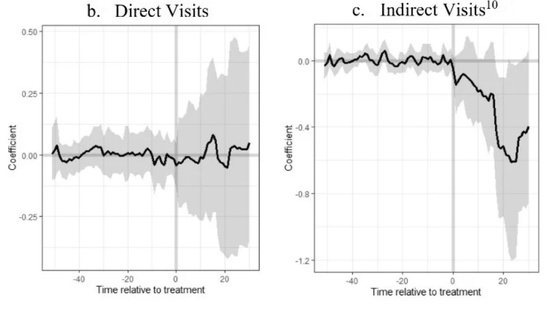Does the price of content affect the number of hits to pirated content?

One of
Price, Piracy, and Search: Which Pirates Respond to Changes in the Legal Price? by Koushyar Rajavi, Brett Danaher, Jesse Newby :: SSRN
https://papers.ssrn.com/sol3/papers.cfm?abstract_id=4849529
Cheaper Prices Reduce Indirect Visits to Pirate Sites, Research Finds * TorrentFreak
https://torrentfreak.com/cheaper-prices-reduce-indirect-visits-to-pirate-sites-research-finds-240609/

Z-Library , one of the largest databases of pirated e-books on the Internet, has been subject to repeated arrests of its operators and site closures , putting its survival in jeopardy, but it has continued to attract many users by changing its structure. The majority of its users are students and teachers, many of whom rely on it due to the soaring prices of textbooks. When it was closed, some lamented that it was a 'modern-day version of the Library of Alexandria burning down.' In Denmark, where tuition is free but textbooks are expensive, data shows that about half of students obtain pirated copies.
A Danish survey shows that more students are buying pirated textbooks because they are too expensive, and about half of students are using pirated textbooks - GIGAZINE

As such, 'the price of content is too high' is often cited as a reason for using pirated copies, but lowering prices as a countermeasure against piracy is difficult to implement because its effectiveness is uncertain. Also, in order to conduct an experiment, it would be necessary to get the rights holders to change the prices of books that are somewhat popular on pirated sites, making it difficult to carry out. There have been similar studies in the past that have investigated whether pirate users would purchase legitimate content if they felt the price was appropriate, but most of these were conducted in the form of interviews such as questionnaires.
Survey results show that pirate users would pay to get content legally if they had the option - GIGAZINE

However, in 2018, the European Union (EU) implemented a legal reform to reduce taxes on e-books, and in some countries such as Ireland that adopted this, the price of e-books fell by up to 14%. Therefore, Kushal Rajavi of the University of Georgia's College of Business, Brett Danaher of Chapman University's School of Business and Economics, and Jesse Newby of Carnegie Mellon University's School of Information Systems and Public Policy are working together to take advantage of this natural price change and examine the relationship between prices and piracy traffic.
The researchers first looked at data on visits to pirate sites from MUSO , a copyright tracking company. As a result, they found that there was no significant change in 'direct traffic' during the period when e-book prices fell by 14% compared to the period before. The researchers speculate that the price reduction had no effect on direct traffic, which refers to 'users who are accustomed to pirate content' who access pirate sites by directly entering the URL or accessing them from bookmarks.
On the other hand, price cuts have been found to affect 'indirect traffic,' such as traffic from search engines to pirate sites or traffic to pirate sites through other means, such as external links. According to the researchers, when the price of e-books in Ireland was reduced by 14% due to tax changes, the number of visits to pirate sites decreased by at least 27%. This effect was small immediately after the price reduction, but grew over time, and the researchers said, 'As users notice the price reduction, they likely stop visiting pirate sites.' The graph below shows the change in traffic over time since the 2018 e-book price revision, with direct traffic on the left and indirect traffic on the right.

As a result, the researchers found that a drop in e-book prices has little impact on direct traffic, i.e., heavy users of pirate sites, but does have the effect of reducing indirect traffic, which is made up of light users. The researchers suggest that 'users who regularly access pirated content are likely to be unaware of price drops because they have little interest in the legal price or access content only from pirate sites. On the other hand, users who use search engines to access pirated content are more likely to notice price drops through their searches and are more likely to think, 'If the price has dropped or is reasonable, I will buy the legitimate book.''
Regarding the significance of their findings, the researchers said: 'Our findings suggest that price may be able to be used to mitigate piracy, but they also highlight the challenges that companies will likely face when trying to convert experienced pirates into legitimate buyers.'
Related Posts:
in Note, Posted by log1e_dh






